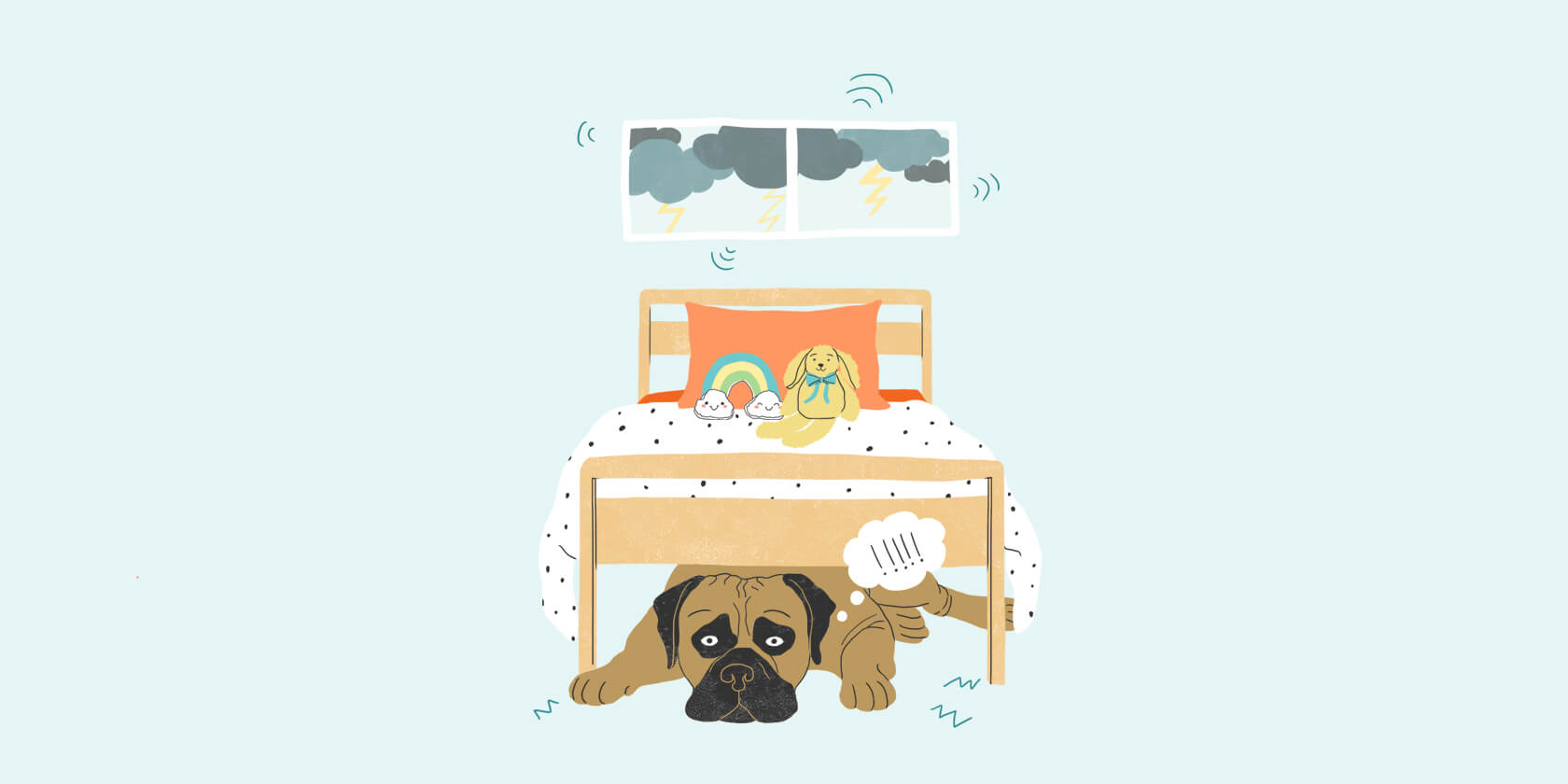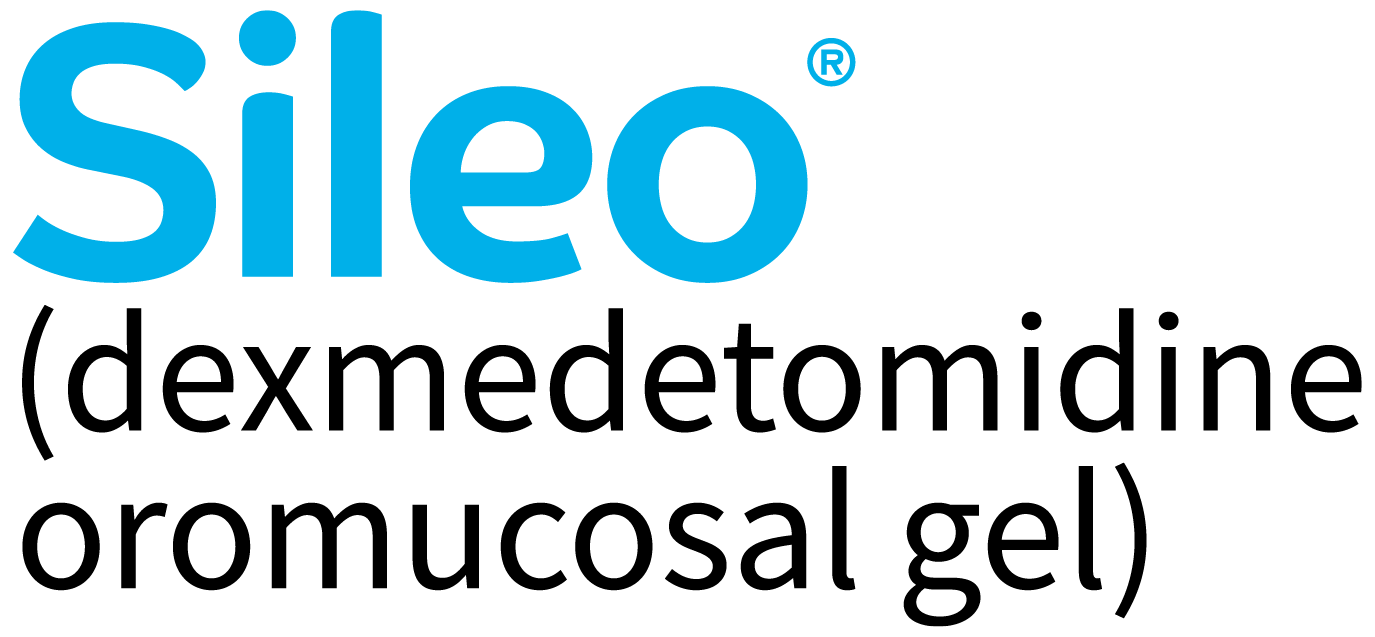Noise aversion, or the set of anxiety or fear-based behaviors displayed when subjected to “noise triggers”, is a common problem for dogs. In fact, in a recent survey, 67% of dogs exhibit at least one sign of noise aversion1.
This fear of noises can negatively affect your dog’s quality of life. Noise phobias increase stress in dogs, which can lead to several problems, like diarrhea, destructive behaviors, and even self-injury.
Your dog might show you that they’re scared of noises in a variety of ways.

Signs of Noise Aversion in Dogs2:
- Pacing or restlessness
- Lip licking
- Trembling or shaking
- Panting
- Excessive alertness or hypervigilance
- Cowering
- Hiding
- Brow furrowed or ears back
- Freezing or immobility
- Owner seeking behavior or excessive clinginess
- Refusing to eat
- Yawning
- Vocalizing (whining or barking at the sounds)
- Escape behaviors
You may not recognize these behaviors as signs that your dog is frightened by the noise, so use this noise aversion checklist to see if your dog suffers from noise aversion. Take it to your veterinarian so that your dog can be diagnosed and start to receive treatment.
Things You Can Do at Home To Help Calm a Dog Scared of Noises:
- Mask the Noise
Play music, audiobooks, or white noise to mask and drown out the noises they’re afraid of. - Set up a Safe Space
Encourage your dog to go to an area such as a basement, closet, or bathroom, where the noise is not as loud. These areas can be safe havens for your dog; once the noise begins, your dog can retreat to this area and feel relatively safe. By feeding your dog treats or putting their favorite toys in the designated safe haven in between noise events, you can get your dog accustomed to going to these areas. - Be Present
Your presence is comforting to your dog. - Act Normal
Rather than paying attention to the noise, play with your dog, read a book or watch TV. Try not to get worked up or anxious yourself, as your dog can sense and feed off of your anxiety. - Distract Them
You can try to distract them from the noise by feeding them, having them work on a puzzle toy, giving them treats, or working on training.
If your dog typically gets scared during certain noise events (such as thunder or fireworks), you can proactively begin counterconditioning and desensitization training to help them get more comfortable and accepting of the sounds. Ask your veterinarian for help with implementing these techniques.
These recommendations will help you and your dog cope better during the noise event. But since noise aversion is itself a medical condition, your veterinarian, may also recommend medications to treat your dog’s noise aversion.
Medications To Help Your Dog Cope With Noise Aversion
It is important to speak to your veterinarian about your dog’s noise aversion, because dogs do not outgrow this condition and without treatment, the signs can get worse or your dog may develop additional behavioral problems. Additionally, it is important to realize that while your dog is showing signs of noise aversion, they are experiencing something like a person having a panic attack. In other words, they are distressed and suffering. Although modifying your home and using behavior modification techniques can help, medication can be one of the most humane, easiest, and most effective ways to help improve your dog’s quality of life.
ZPC-00582R1
IMPORTANT SAFETY INFORMATION: Do not use Sileo in dogs with severe cardiovascular disease, respiratory, liver or kidney diseases, or in conditions of shock, severe debilitation, or stress due to extreme heat, cold or fatigue or in dogs hypersensitive to dexmedetomidine or to any of the excipients. Sileo should not be administered in the presence of preexisting hypotension, hypoxia, or bradycardia. Do not use in dogs sedated from previous dosing. Sileo has not been evaluated in dogs younger than 16 weeks of age or in dogs with dental or gingival disease that could have an effect on the absorption of Sileo. Sileo has not been evaluated for use in breeding, pregnant, or lactating dogs or for aversion behaviors to thunderstorms. Transient pale mucous membranes at the site of application may occur with Sileo use. Other uncommon adverse reactions included emesis, drowsiness or sedation. Handlers should avoid direct exposure of Sileo to their skin, eyes or mouth. Always review INSTRUCTIONS FOR USE before dispensing and dosing. See Prescribing Information.
The product information provided in this site is intended only for residents of the United States. The products discussed herein may not have marketing authorization or may have different product labeling in different countries. The animal health information contained herein is provided for educational purposes only and is not intended to replace discussions with an animal healthcare professional. All decisions regarding the care of a veterinary patient must be made with an animal healthcare professional, considering the unique characteristics of the patient.
Sileo® is trademark owned by Orion Corporation Orion Pharma Animal Health. It is manufactured by Orion Corporation and distributed by Zoetis under license from Orion Corporation Orion Pharma Animal Health.
- The Harris Poll: Custom Motion Sickness and Noise Aversion Omnibus Pet Owner Quantitative Research Report, December 2018.
- Zoetis: Foster Rosenblatt Noise Aversion Research; February 5th, 2016.




